Willy Fritsch, Dita Parlo and Lil Dagover play a love triangle in the wonderful Film Operetta Ungarische Rhapsodie/Hungarian Rhapsody (Hanns Schwarz, 1928). Many well-known names in the cast and the crew supported them in this marvellous production from the heydays of the Ufa under production manager Erich Pommer.
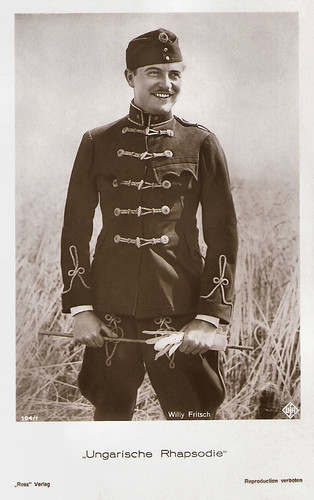
German postcard by Ross Verlag, no. 104/1. Photo: Ufa. Publicity still for Ungarische Rhapsodie/Hungarian Rhapsody (Hanns Schwarz, 1928) with Willy Fritsch.
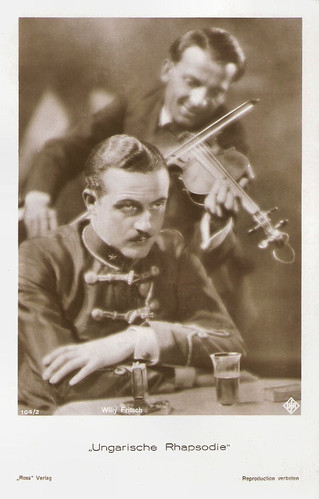
German postcard by Ross Verlag, no. 104/2. Photo: Ufa. Publicity still for Ungarische Rhapsodie/Hungarian Rhapsody (Hanns Schwarz, 1928) with Willy Fritsch.
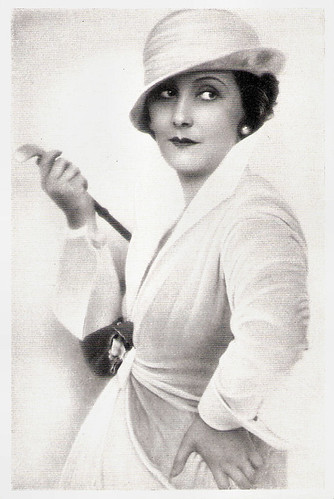
German collectors card by Ross Verlag for the album Vom Werden deutscher Filmkunst. Teil I. Der stumme Film (Cigaretten-Bilderdienst Altona-Bahrenfeld 1935), Bild no. 189, Gruppe 41. Photo: Ufa. Publicity still for Ungarische Rhapsodie/Hungarian Rhapsody (Hanns Schwarz, 1928).
The silent Ufa romantic drama Ungarische Rhapsodie/Hungarian Rhapsody (Hanns Schwarz, 1928) is set during harvest time on the plains of Hungary, in Mezohegyes.
A young and handsome Willy Fritsch stars as the Hussar Franz, Lieutenant Count von Turoczy, who is brooding about his future. Though born into an aristocratic family, his father drank away the family fortune.
He also must deal with the army regulation that an officer must have forty-five thousand crowns before he can take a wife. Franz loves charming Marika (Dita Parlo) a commoner whose father works as the estate manager for the wealthy Baron Barsody. But Marika just wants to love someone who works with her on the field and rejects him.
When Baron Barsody's beautiful wife, Camilla (Lil Dagover) visits the estate, Franz begins a hot flirtation with her at the harvest festival. Turoczy is betrayed by a jealous gipsy, and now the husband's anger threatens him. Marika recognises the danger to her lover and saves her beloved Hussar. Of course, they love and live happily ever after.
Ungarische Rhapsodie has several well-known supporting actors in its cast, like Fritz Greiner as Marika’s father, Erich Kaiser-Titz as General Hoffmann, Leopold Kramer as Baron Barsody, Harry Hardt as Oberleutnant Barany, Italian actor Osvaldo Valenti as the ensign, and Paul Hörbiger as a waiter.
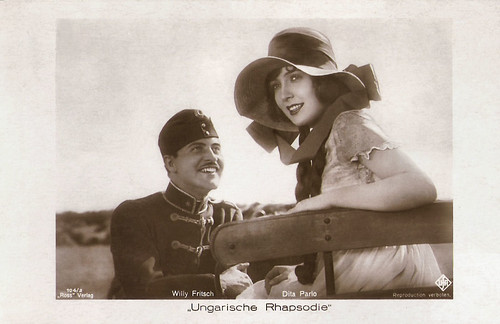
German postcard by Ross Verlag, no. 104/3, 1925-1935. Photo: Ufa. Publicity still for Ungarische Rhapsodie/Hungarian Rhapsody (Hanns Schwarz, 1928) with Willy Fritsch and Dita Parlo.
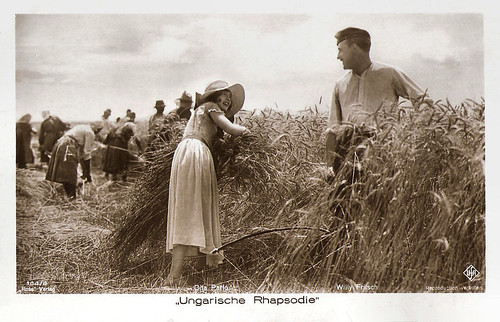
German postcard by Ross Verlag, no. 104/4. Photo: Ufa. Publicity still for Ungarische Rhapsodie/Hungarian Rhapsody (Hanns Schwarz, 1928) with Willy Fritsch and Dita Parlo.

German postcard. Erich Pommer Produktion for Ufa. Photo: Ufa. Postcard based on a publicity still for Ungarische Rhapsodie/ Hungarian Rhapsody (Hanns Schwarz, 1928).
Austrian director Hanns Schwarz (1888–1945) specialised in the genre of the ‘Film Operetta’, which was already very popular in the silent (!) era. Examples are Die Csardasfürstin (1927) with Liane Haid and Die Wundebare Lüge Der Nina Petrovna/The Wonderful Lies of Nina Petrovna (1929) with Brigitte Helm and Franz Lederer.
His Ungarische Rhapsodie/Hungarian Rhapsody (1928) is also a delicious example of his craft. Overseer-3 at IMDb: “With a definite Ernst Lubitsch feel, this romantic and sexy German silent should be much better known. Starring a devilishly handsome young Willy Fritsch as an impoverished soldier lusting after a forbidden love, a devastatingly beautiful Dita Parlo (famous from Grand Illusion, but here with long dark hair instead of blonde) as his sensible lady love, and a kittenish Lil Dagover, playing the bored wife of an aristocrat who comes between them, and directed by Hanns Schwartz, this film is highly recommended for all romantics.”
Herr Graf Ferdinand Von Galitzien at IMDb: "The most remarkable aspect of this film which perhaps lingers too long on Hungarian picturesqueness, is the important German cast that starred in the film. In addition to the skilful Herr Schwarz direction with its attentiveness to love and lust, we have a screenplay written by another important German director, Herr Joe May, who directed films so important for silent cinema history as Heimkehr (1928) and Asphalt (1929).”
Another important figure behind the film was Erich Pommer, Ufa’s production manager who helped to create an incredible amount of unforgettable classics for the studio during the Weimar period. Both Pommer, script-writers Joe May and Hans Székely, and the Jewish Schwarz had to flee after the rise of the Nazis.
Sadly, the German cinema would never fully recover from the immense artistic brain drain that happened in 1933. It also broke so many interesting careers in the cinema, like those of Pommer, Schwarz, May and Székely.
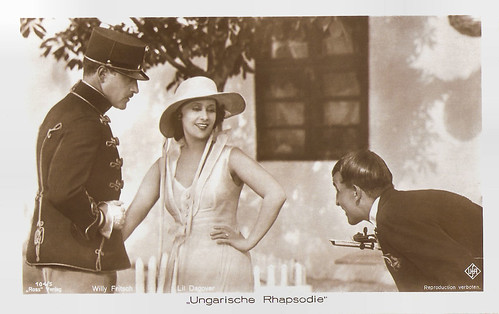
German postcard by Ross Verlag, no. 104/5. Photo: Ufa. Publicity still for Ungarische Rhapsodie/Hungarian Rhapsody (Hanns Schwarz, 1928) with Willy Fritsch and Lil Dagover.
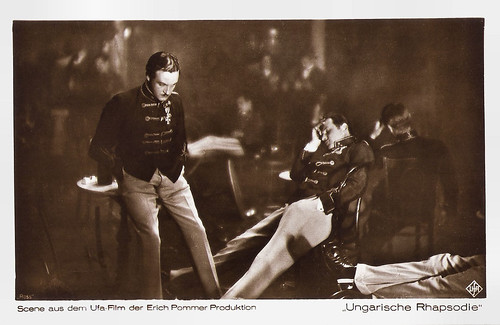
German postcard by Ross Verlag. Photo: Ufa. Publicity still for Ungarische Rhapsodie/Hungarian Rhapsody (Hanns Schwarz, 1928) with Willy Fritsch.
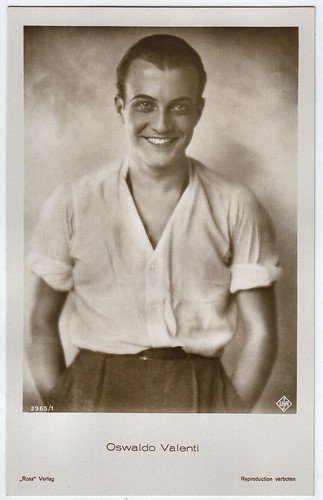
German postcard by Ross Verlag, no. 3965/1, 1928-1929. Photo: Ufa. Publicity still for Ungarische Rhapsodie/Hungarian Rhapsody (Hanns Schwarz, 1928) with Osvaldo Valenti. Collection: Marlene Pilaete.
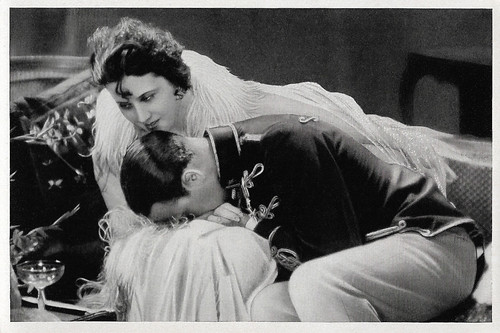
German collectors card by Ross Verlag in the series Vom Werden deutscher Filmkunst - Der Stumme Film, picture no. 111, group 43. Photo: Ufa. Publicity still for Ungarische Rhapsodie/Hungarian Rhapsody (Hanns Schwarz, 1928) with Lil Dagover and Willy Fritsch.
Source: Overseer-3 (IMDb), Herr Graf Ferdinand Von Galitzien (IMDb), Filmportal.de, Wikipedia and IMDb.
This post was last updated on 5 January 2024.

German postcard by Ross Verlag, no. 104/1. Photo: Ufa. Publicity still for Ungarische Rhapsodie/Hungarian Rhapsody (Hanns Schwarz, 1928) with Willy Fritsch.

German postcard by Ross Verlag, no. 104/2. Photo: Ufa. Publicity still for Ungarische Rhapsodie/Hungarian Rhapsody (Hanns Schwarz, 1928) with Willy Fritsch.

German collectors card by Ross Verlag for the album Vom Werden deutscher Filmkunst. Teil I. Der stumme Film (Cigaretten-Bilderdienst Altona-Bahrenfeld 1935), Bild no. 189, Gruppe 41. Photo: Ufa. Publicity still for Ungarische Rhapsodie/Hungarian Rhapsody (Hanns Schwarz, 1928).
Hot flirtation
The silent Ufa romantic drama Ungarische Rhapsodie/Hungarian Rhapsody (Hanns Schwarz, 1928) is set during harvest time on the plains of Hungary, in Mezohegyes.
A young and handsome Willy Fritsch stars as the Hussar Franz, Lieutenant Count von Turoczy, who is brooding about his future. Though born into an aristocratic family, his father drank away the family fortune.
He also must deal with the army regulation that an officer must have forty-five thousand crowns before he can take a wife. Franz loves charming Marika (Dita Parlo) a commoner whose father works as the estate manager for the wealthy Baron Barsody. But Marika just wants to love someone who works with her on the field and rejects him.
When Baron Barsody's beautiful wife, Camilla (Lil Dagover) visits the estate, Franz begins a hot flirtation with her at the harvest festival. Turoczy is betrayed by a jealous gipsy, and now the husband's anger threatens him. Marika recognises the danger to her lover and saves her beloved Hussar. Of course, they love and live happily ever after.
Ungarische Rhapsodie has several well-known supporting actors in its cast, like Fritz Greiner as Marika’s father, Erich Kaiser-Titz as General Hoffmann, Leopold Kramer as Baron Barsody, Harry Hardt as Oberleutnant Barany, Italian actor Osvaldo Valenti as the ensign, and Paul Hörbiger as a waiter.

German postcard by Ross Verlag, no. 104/3, 1925-1935. Photo: Ufa. Publicity still for Ungarische Rhapsodie/Hungarian Rhapsody (Hanns Schwarz, 1928) with Willy Fritsch and Dita Parlo.

German postcard by Ross Verlag, no. 104/4. Photo: Ufa. Publicity still for Ungarische Rhapsodie/Hungarian Rhapsody (Hanns Schwarz, 1928) with Willy Fritsch and Dita Parlo.

German postcard. Erich Pommer Produktion for Ufa. Photo: Ufa. Postcard based on a publicity still for Ungarische Rhapsodie/ Hungarian Rhapsody (Hanns Schwarz, 1928).
A definite Ernst Lubitsch feel
Austrian director Hanns Schwarz (1888–1945) specialised in the genre of the ‘Film Operetta’, which was already very popular in the silent (!) era. Examples are Die Csardasfürstin (1927) with Liane Haid and Die Wundebare Lüge Der Nina Petrovna/The Wonderful Lies of Nina Petrovna (1929) with Brigitte Helm and Franz Lederer.
His Ungarische Rhapsodie/Hungarian Rhapsody (1928) is also a delicious example of his craft. Overseer-3 at IMDb: “With a definite Ernst Lubitsch feel, this romantic and sexy German silent should be much better known. Starring a devilishly handsome young Willy Fritsch as an impoverished soldier lusting after a forbidden love, a devastatingly beautiful Dita Parlo (famous from Grand Illusion, but here with long dark hair instead of blonde) as his sensible lady love, and a kittenish Lil Dagover, playing the bored wife of an aristocrat who comes between them, and directed by Hanns Schwartz, this film is highly recommended for all romantics.”
Herr Graf Ferdinand Von Galitzien at IMDb: "The most remarkable aspect of this film which perhaps lingers too long on Hungarian picturesqueness, is the important German cast that starred in the film. In addition to the skilful Herr Schwarz direction with its attentiveness to love and lust, we have a screenplay written by another important German director, Herr Joe May, who directed films so important for silent cinema history as Heimkehr (1928) and Asphalt (1929).”
Another important figure behind the film was Erich Pommer, Ufa’s production manager who helped to create an incredible amount of unforgettable classics for the studio during the Weimar period. Both Pommer, script-writers Joe May and Hans Székely, and the Jewish Schwarz had to flee after the rise of the Nazis.
Sadly, the German cinema would never fully recover from the immense artistic brain drain that happened in 1933. It also broke so many interesting careers in the cinema, like those of Pommer, Schwarz, May and Székely.

German postcard by Ross Verlag, no. 104/5. Photo: Ufa. Publicity still for Ungarische Rhapsodie/Hungarian Rhapsody (Hanns Schwarz, 1928) with Willy Fritsch and Lil Dagover.

German postcard by Ross Verlag. Photo: Ufa. Publicity still for Ungarische Rhapsodie/Hungarian Rhapsody (Hanns Schwarz, 1928) with Willy Fritsch.

German postcard by Ross Verlag, no. 3965/1, 1928-1929. Photo: Ufa. Publicity still for Ungarische Rhapsodie/Hungarian Rhapsody (Hanns Schwarz, 1928) with Osvaldo Valenti. Collection: Marlene Pilaete.

German collectors card by Ross Verlag in the series Vom Werden deutscher Filmkunst - Der Stumme Film, picture no. 111, group 43. Photo: Ufa. Publicity still for Ungarische Rhapsodie/Hungarian Rhapsody (Hanns Schwarz, 1928) with Lil Dagover and Willy Fritsch.
Source: Overseer-3 (IMDb), Herr Graf Ferdinand Von Galitzien (IMDb), Filmportal.de, Wikipedia and IMDb.
This post was last updated on 5 January 2024.
No comments:
Post a Comment